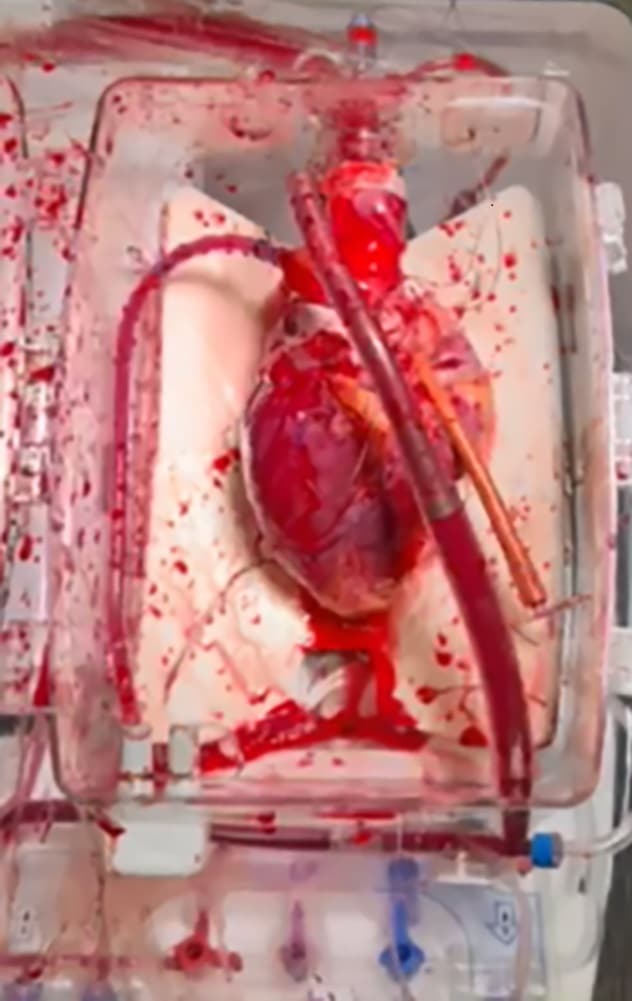Dec. 16, 2022
Heart transplant specialists at the Mayo Clinic campus in Arizona have completed their first transplant using a new perfusion system, often called "heart in a box," which greatly improves sustenance of donor hearts for transplant. This is the first heart transplant using this technology in the state.
This development is part of a larger Mayo Clinic-wide technology innovation effort to serve the needs of and offer significant benefits to patients requiring transplant.
"Heart in a box"

"Heart in a box"
New perfusion system preserves a heart while it is beating, extending the time between retrieval and transplant by several hours.
The standard heart preservation technique preserves a heart for a window of approximately 3 to 5 hours. However, the new system preserves a heart while it is beating, extending the time between retrieval and transplant by several hours. In addition, the "heart in a box" has the potential to widen the donor pool by supporting the novel use of donation after circulatory death (DCD) hearts by reviving and supporting the recovery of nonbeating hearts.
Heart perfusion system benefits
When transplant specialists place a retrieved donor organ in the "heart in a box" machine, it perfuses the organ with warm, oxygenated blood, reviving the heart from nonbeating to beating status. The system's measurements also give transplant professionals an opportunity to confirm the heart's function before accepting it for transplant.
Mayo Clinic in Arizona heart transplant specialists say the "heart in a box" perfusion system analyzes the heart's hemodynamic parameters, monitoring every 15 to 30 minutes as if it were a patient in the ICU. The transplant team must resuscitate the heart until it meets strict transplant criteria.
In most heart donors who meet brain death criteria, the heart is still beating and working well. However, DCD hearts have stopped and need to be revived and evaluated before they can be used for transplant. Beyond increasing organ availability by facilitating DCD heart donations, the perfusion system offers the following advantages:
- Allows a heart to travel distances — even by air — up to 1,000 miles or six hours
- Enables use of older hearts and hearts that previously would have been unusable
The heart perfusion system not only helps shorten the heart transplant waitlist by increasing the donor pool but also translates to better outcomes and fewer patient deaths while awaiting a heart, according to the Mayo Clinic transplant surgeons. The surgeons indicate that use of DCD organs through a heart perfusion device also presents opportunities for earlier transplantation in the most ill patients by reducing competition for hearts through the larger donor pool. Transplant of perfused hearts allows use of DCD organs that previously would not have been used.
While some medical centers hesitate to use extended-criteria hearts and have concerns about ischemia time, the Mayo Clinic surgeons are excited about the possibility of more available hearts through perfusion, especially in the case of DCD organs, which arise with patients who have experienced severe damage incompatible with life. Until recently, physicians have considered abdominal organs for transplant rather than heart transplant with these donors.
Heart perfusion costs
Using a heart perfusion system for transplant requires not only considerable surgical skill but significant logistic support as well. Perfusion systems also increase heart transplant costs, as they require additional personnel. Yet the Mayo Clinic surgeons explain that even if use of the heart perfusion system impacts a medical center's bottom line, it adds significant value by shortening patients' transplant wait times and reducing pretransplant hospital length of stay, decreasing costs.
Future for heart perfusion systems
The Mayo Clinic in Arizona transplant specialists do not envision perfusion system use in all heart transplants, explaining that it is unnecessary for younger donors or in local surgery where organ transfer occurs more rapidly.
The FDA approved the "heart in a box" system for DCD hearts in the fall of 2021. Currently, a clinical trial is studying the transplantation of DCD hearts using this system, according to LifeSource.
The Mayo Clinic Transplant Center performs more than 130 heart transplants yearly enterprisewide.
Though heart perfusion doesn't offer organ restoration presently, that is the long-range goal. Right now, the Mayo Clinic heart transplant specialists say heart perfusion provides pseudo-restoration, yet only with traditionally transplant-eligible hearts. The "heart in a box" system enables extended-criteria heart use, allowing more patients to receive heart transplants.
For more information
Organ Care System (OCS) Heart System — P180051. U.S. Food and Drug Administration.
DCD heart trials: A life-saving innovation. LifeSource.
Refer a patient to Mayo Clinic.